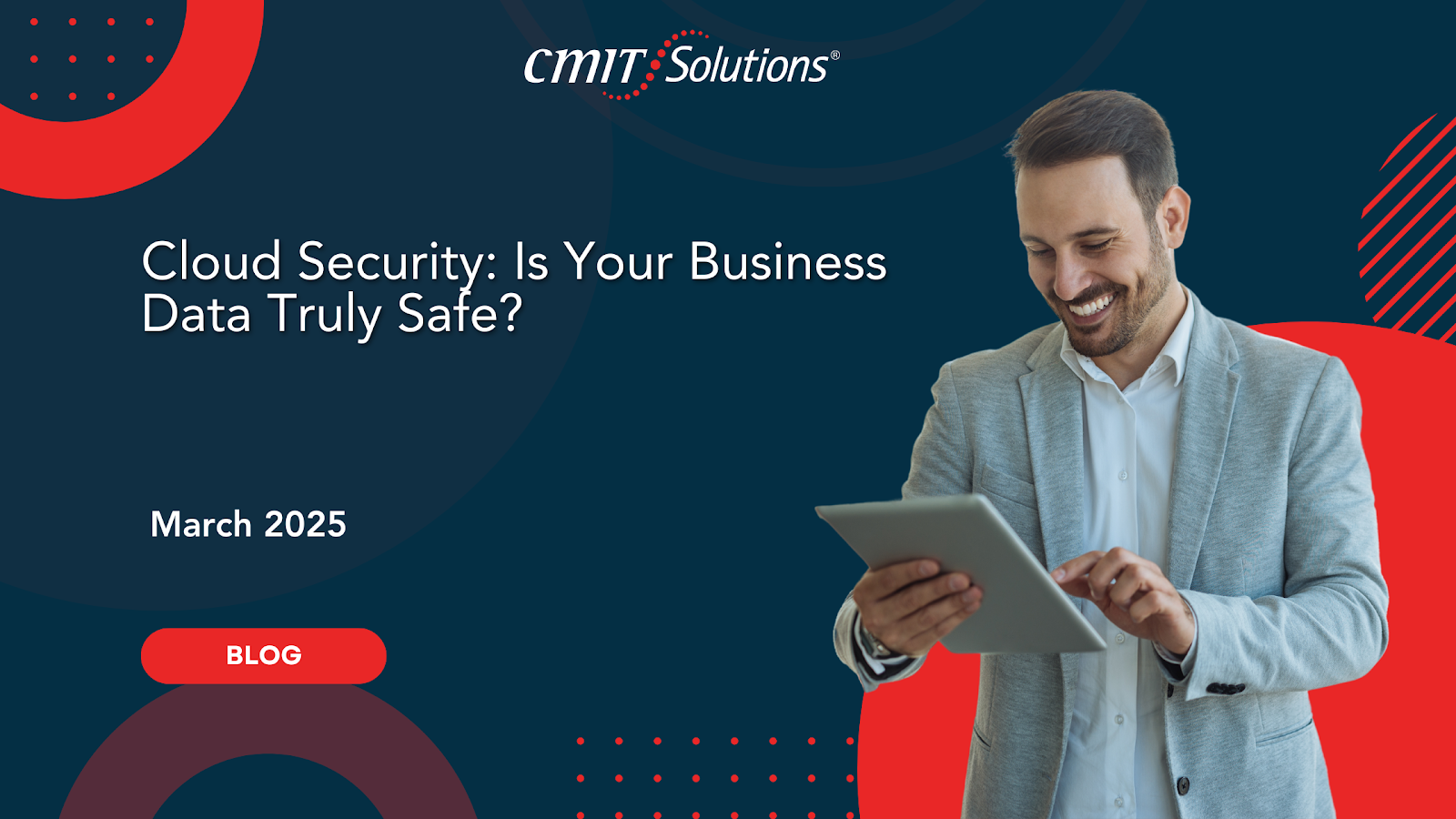The Growing Dependence on Cloud Computing
Cloud computing has revolutionized the way businesses operate. Small businesses now rely on cloud storage, SaaS applications, and remote collaboration tools to enhance efficiency and reduce IT costs. However, as more companies move their data to the cloud, cyber threats targeting cloud environments have also surged.
While cloud platforms offer scalability, flexibility, and cost savings, they also introduce new security risks. Many business owners assume their data is automatically safe in the cloud, but without proper security measures, sensitive business information can be exposed to cybercriminals, data breaches, and compliance violations.
This article explores:
- The top cloud security risks small businesses face.
- How cybercriminals target cloud environments.
- Best practices to ensure your cloud data remains protected.
Common Cloud Security Risks for Small Businesses
1. Data Breaches and Unauthorized Access
Cloud environments store confidential business information, customer data, and financial records, making them prime targets for hackers. A misconfigured cloud security setting or weak login credentials can allow unauthorized users to access sensitive files.
🔹 Example: If an employee’s login credentials are stolen, cybercriminals can gain access to cloud-stored financial data, leading to fraud, regulatory violations, and reputational damage.
Prevention:
✔ Implement Multi-Factor Authentication (MFA) to prevent unauthorized access.
✔ Set up strict role-based access controls (RBAC) to limit access to sensitive files.
✔ Conduct regular security audits to detect vulnerabilities.
2. Cloud Misconfigurations and Insider Threats
Misconfigured cloud settings are among the leading causes of data leaks. Many businesses fail to adjust security controls after migrating to the cloud, leaving their files exposed to public access.
Additionally, insider threats—whether intentional or accidental—can compromise cloud security. Employees with unrestricted access may inadvertently delete files, leak confidential information, or introduce security loopholes.
🔹 Example: A misconfigured cloud storage bucket may leave customer records publicly accessible, leading to privacy violations and potential fines under compliance regulations like GDPR and HIPAA.
Prevention:
✔ Review and apply secure cloud configurations before deploying business data.
✔ Use audit logs to monitor who accesses and modifies sensitive data.
✔ Restrict administrative privileges to only necessary personnel.
3. Ransomware and Malware in Cloud Systems
Cloud environments are not immune to ransomware attacks. Cybercriminals can infiltrate cloud-based storage or applications through phishing emails, malicious software downloads, or weak security configurations.
Once ransomware spreads, businesses risk losing access to critical files unless they pay a ransom—which does not guarantee file recovery.
🔹 Example: A small business using cloud-based collaboration tools may experience a ransomware attack that encrypts all shared files, halting operations for days.
Prevention:
✔ Deploy advanced endpoint protection to detect and block malware.
✔ Maintain regular cloud backups to restore data without paying ransom demands.
✔ Implement email security filters to prevent phishing scams from reaching employees.
4. Compliance Violations and Legal Risks
Many industries require strict data security compliance to protect customer information. Businesses that store or process data in the cloud must ensure their cloud provider meets regulatory standards.
🔹 Example: A medical practice using a cloud-based system for patient records must comply with HIPAA regulations. Failure to secure cloud-stored health data could result in legal fines and loss of patient trust.
Prevention:
✔ Choose cloud providers that comply with industry standards (e.g., HIPAA, PCI-DSS, GDPR).
✔ Encrypt sensitive data stored in the cloud to prevent unauthorized access.
✔ Regularly assess compliance risks and update security policies accordingly.
How Cybercriminals Target Cloud Systems
1. Phishing Attacks to Steal Login Credentials
Cybercriminals trick employees into providing login details through fake emails. Once they gain access, they can steal, modify, or delete critical business data.
✔ Train employees to identify phishing emails and report suspicious activity.
✔ Use MFA to secure cloud logins and prevent unauthorized access.
2. Cloud Account Hijacking
Hackers exploit weak passwords or compromised credentials to take over cloud accounts, leading to data theft and operational disruption.
✔ Implement password policies requiring strong, unique passwords.
✔ Enable security alerts for suspicious login attempts from unknown devices.
3. Distributed Denial-of-Service (DDoS) Attacks
Attackers overwhelm cloud servers with excessive traffic, causing slowdowns, crashes, and downtime.
✔ Use cloud-based firewalls and DDoS protection tools to prevent attacks.
✔ Ensure your cloud provider has built-in network security protections.
Best Practices for Cloud Security
1. Choose a Secure and Reliable Cloud Provider
Not all cloud services offer strong security features by default. Businesses should partner with a cloud provider that offers built-in security controls, compliance support, and data encryption.
✔ Research security certifications like ISO 27001 or SOC 2 compliance.
✔ Ensure regular security updates and automatic patches are available.
2. Encrypt Data Before Uploading to the Cloud
Encryption ensures that even if a hacker accesses your cloud storage, the data remains unreadable without the encryption key.
✔ Use end-to-end encryption for sensitive files and databases.
✔ Store encryption keys separately from the cloud provider.
3. Implement Strong Access Control Policies
Restrict who can access cloud data and limit administrative privileges.
✔ Use role-based access control (RBAC) to grant permissions only as needed.
✔ Review access logs to detect unauthorized or unusual activities.
4. Regularly Back Up Cloud Data
In case of accidental deletion, ransomware, or a system outage, having cloud backups ensures rapid data recovery.
✔ Store backups in multiple locations (on-premises and cloud).
✔ Test disaster recovery plans to ensure smooth restoration when needed.
How CMIT Solutions of Boston, Newton, and Waltham Helps Secure Your Cloud Infrastructure
Many small businesses lack the in-house expertise to properly secure cloud environments. CMIT Solutions of Boston, Newton, and Waltham provides comprehensive cloud security solutions to protect business data, applications, and workflows.
Our Cloud Security Services Include:
✔ Cloud Security Assessments – Identify vulnerabilities in your cloud environment.
✔ Data Encryption & Access Controls – Protect sensitive business information.
✔ Multi-Factor Authentication (MFA) Implementation – Secure cloud logins from unauthorized access.
✔ Ransomware Protection & Backup Solutions – Prevent data loss and ensure fast recovery.
✔ Compliance & Regulatory Support – Ensure industry compliance for cloud-based operations.
With CMIT Solutions, your cloud data remains secure, compliant, and resilient against cyber threats.
Take Control of Your Cloud Security – Get a Free IT Security Assessment
Are you confident that your cloud data is fully protected against cyber threats? Many businesses unintentionally expose sensitive information due to weak configurations, lack of encryption, and poor access controls.
CMIT Solutions of Boston, Newton, and Waltham is offering a FREE IT Security Assessment to help businesses:
✔ Identify cloud security risks and vulnerabilities.
✔ Evaluate compliance gaps and data protection measures.
✔ Receive expert recommendations to strengthen cloud security.
📌 Assess your cloud security today: IT Security Assessment Form
📞 Talk to our cloud security specialists: (617) 657-1075
🌐 Learn more about our cloud security solutions: CMIT Solutions of Boston, Newton, and Waltham
Cloud security is not optional—it’s a necessity for modern businesses. Take proactive steps today to ensure your cloud data remains safe, accessible, and fully protected.





